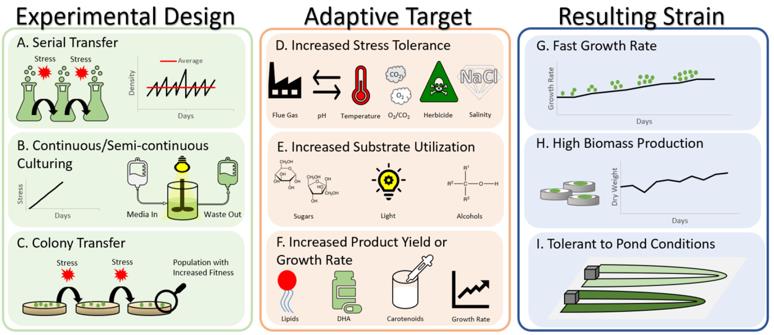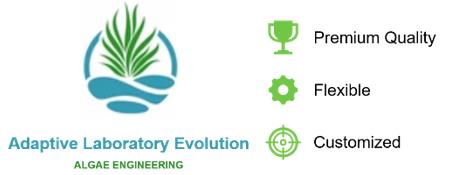Adaptive Laboratory Evolution Service for Algae
ALE (Adaptive Laboratory Evolution) is a practical means of improving the health of algae under stress, enabling the modification of algae without prior knowledge.
Lifeasible has been engaged in ALE research for algae for many years and is able to personalize and customize our ALE services according to the needs of our customers.
Introduction to ALE
ALE is a classical concept of a population reproducing for multiple generations in a controlled environment, allowing mutations to accumulate and more suitable organisms to emerge. ALE can be used to accelerate the adaptation of algae by increasing the genetic diversity of founding populations. However, too many mutations can lead to loss of adaptive capacity, as the accumulation of neutral or deleterious changes can suppress beneficial mutations under certain conditions. Such mutations can produce specialized microalgae that, while performing well in one environmental condition, lose their competitive advantages in another.
ALE in Algae
Many microalgal species (both cyanobacteria and eukaryotes) have spontaneous mutation rates of approximately 1-10 × 10-10 mutations per nucleotide per generation. By bringing in genome sizes of 1.6-100 Mbp and doubling times of 2 hours to 1 day, it is therefore calculated that algae are able to generate the genetic diversity required for evolutionary adaptation in the laboratory within a meaningful time frame. Serial batch cultures and continuous cultures are two types of culture methods in the ALE process.
 Fig.1 Summary of typical adaptive laboratory evolution in algae. (LaPanse, A. J., et al., 2021, Algal Research)
Fig.1 Summary of typical adaptive laboratory evolution in algae. (LaPanse, A. J., et al., 2021, Algal Research)
Choice of Stress
Many biotechnology-related processes can be regulated by a variety of pressures, such as light, salt, temperature, nitrogen content, and so on. For a successful ALE, the level and selection of the stresses applied need to be optimal. Stresses that are too high can kill entire cultures before they evolve, while stresses that are too low can lead to the failure of adaptation experiments.
The Application of ALE
With the emergence of microalgae as biomass for biofuel and biochemical production, bioremediation, food, and feed workhorses, there is a lot of opportunity to use ALE for microalgae engineering.
Increased Growth Rate - Productivity and yield remain critical indicators for determining the biotechnological potential and economic viability of specific microalgal strains, and enhanced growth rates can significantly increase productivity.
Increased stress tolerance - Adaptation of microalgae to stressful conditions can be increased by ALE, which includes extreme temperatures, elevated carbon dioxide or oxygen levels, extreme pH, altered light conditions, high salinity, and exposure to herbicides.
Increased substrate utilization - According to the biofuels or bioproducts produced by the microalgal ponds, it may be useful to improve the tolerance of the cultures to high sugars, alcohols, or other non-native compounds to produce bioethanol or a myriad of biodiesel products.
Increased product yield - Maximization of product yield is an evident aim of microalgae ALE as there is the potential to increase the yield of valuable cellular components to improve the economic viability of industrial microalgae, such as improving the microalgal lipid content.
Our Services
With years of experience in ALE experiments, our company is able to provide professional and comprehensive ALE services.
- One-Step ALE Services
An effective approach to facilitate the adaption of algae. - Selection Services of Appropriate Stresses
Using mathematical methods for analyzing the response to environmental stress. - Mutant Screening Services
Quantitative and qualitative analysis approaches are used for mutation screening.
Why Choose Us
As a well-established and professional CRO company, Lifeasible has the professional equipment and team to support our ALE services for algae. Please contact us for more information.

Reference
- LaPanse, A. J., Krishnan, A., & Posewitz, M. C. (2021). Adaptive Laboratory Evolution for algal strain improvement: Methodologies and applications. Algal Research, 53, 102122.
Our services are for research use only and not for any clinical use.